Key takeaways
- Ethical egoism redefines moral responsibilities by emphasizing the importance of self-interest alongside consideration for others.
- The philosophy encourages setting boundaries to protect personal well-being, leading to healthier relationships without guilt.
- Understanding that everyone pursues their own interests fosters empathy and negotiation skills in interpersonal dynamics.
- Practicing ethical egoism is about honest self-assessment and maintaining authenticity while balancing personal needs with those of others.
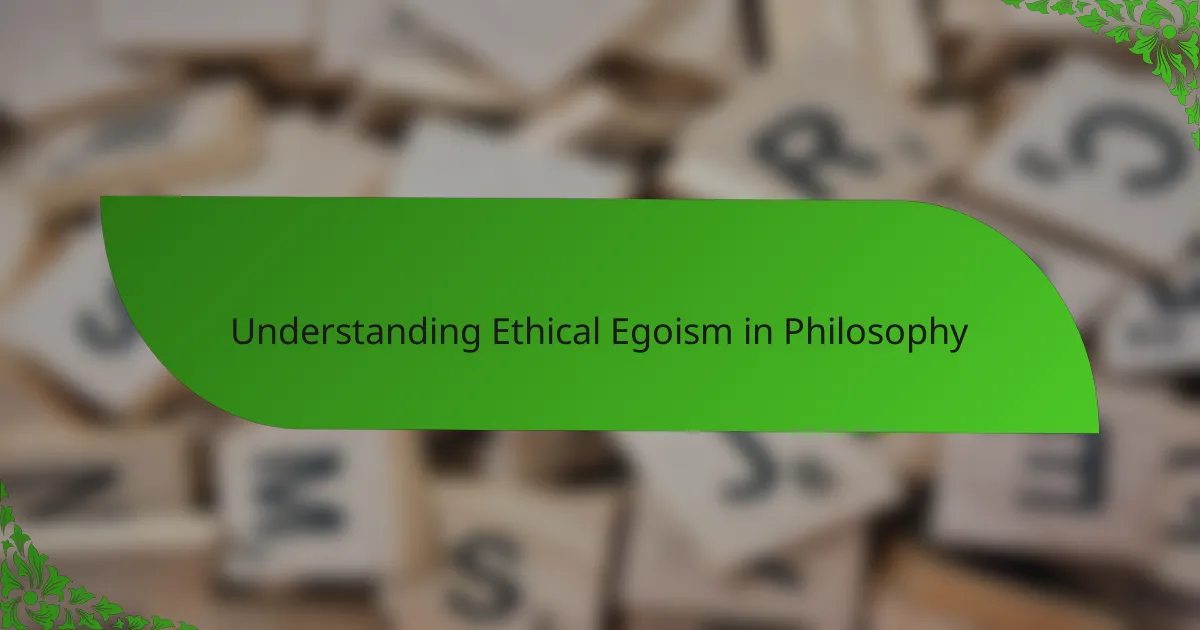
Understanding Ethical Egoism in Philosophy
When I first encountered ethical egoism, I was struck by how it challenges the conventional idea that we should always put others before ourselves. It made me wonder: Is acting in my own best interest really selfish, or can it be a moral duty? Wrestling with this question stirred a mix of curiosity and discomfort that stayed with me.
As I dug deeper, I realized ethical egoism isn’t about reckless self-centeredness, but about recognizing the importance of one’s own well-being in moral decisions. I found this perspective surprisingly empowering—it gave me a new lens through which to judge my choices without feeling guilty for prioritizing myself sometimes. Have you ever felt torn between helping others and taking care of yourself? This philosophy helped me see that tension in a new light.
In philosophy, ethical egoism stands out because it flips altruistic assumptions on their head, proposing that pursuing your own good can be the highest ethical aim. Learning this made me question how society frames morality—why do we often paint self-interest as negative? Understanding this helped me appreciate the complexity of ethics beyond simple “right” or “wrong” labels.
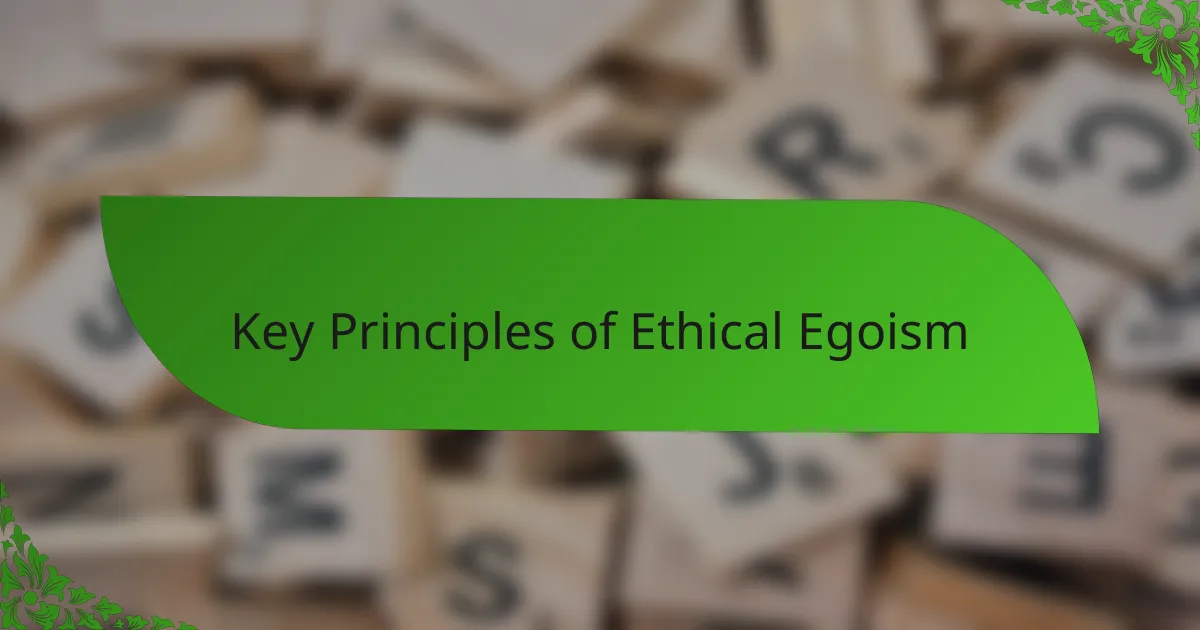
Key Principles of Ethical Egoism
One principle that really struck me is that ethical egoism holds that each person ought to act in their own best interest. This felt both natural and unsettling—natural because taking care of myself seems reasonable, but unsettling because it challenged the idea that morality requires self-sacrifice. It made me ask myself: Can I truly be moral by focusing on what benefits me alone?
Another key point is that ethical egoism doesn’t necessarily endorse harming others to get ahead. Instead, it suggests that pursuing my own good is compatible with respecting others’ interests, as long as my actions ultimately serve my long-term well-being. This nuance surprised me. I realized it’s not about being ruthless, but about a balanced self-focus.
Finally, ethical egoism emphasizes consistency—if I believe everyone should act in their own self-interest, then I must accept that others will too. This raised the question: How do my personal goals align with a world where everyone prioritizes themselves? Wrestling with this helped me appreciate the philosophical challenge of ethical egoism beyond its surface idea.
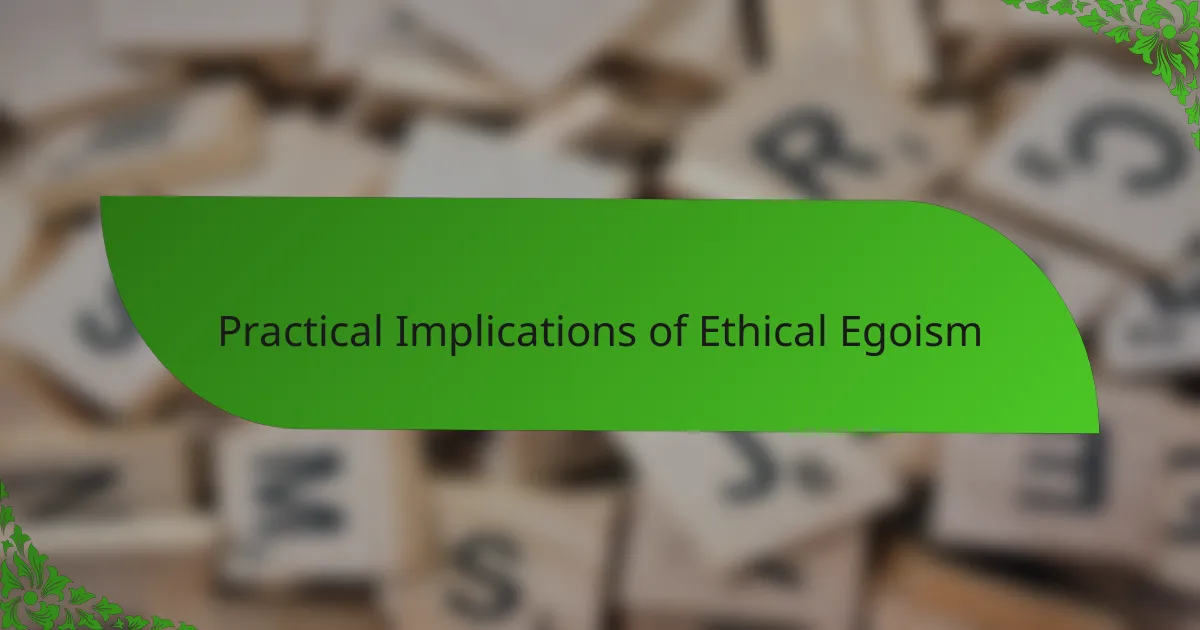
Practical Implications of Ethical Egoism
Thinking about the practical implications of ethical egoism, I found myself asking: If I truly put my own interests first, how does that shape my daily interactions? It became clear that this philosophy encourages me to set boundaries more confidently, knowing that protecting my well-being isn’t selfish but necessary.
At the same time, I noticed a tension—does pursuing my own good mean disregarding others? My experience taught me that ethical egoism doesn’t demand cold disregard; rather, it invites a kind of self-respect that naturally fosters healthier relationships. When I care for myself authentically, I can engage with others without burnout or resentment.
But here’s a challenge I confronted: living ethically egoistically means accepting that others will also act in their own self-interest, which can lead to conflict. Navigating this reality pushes me to develop empathy and negotiation skills, balancing my needs with theirs. This practical balancing act made the philosophy feel less abstract and much more relevant.
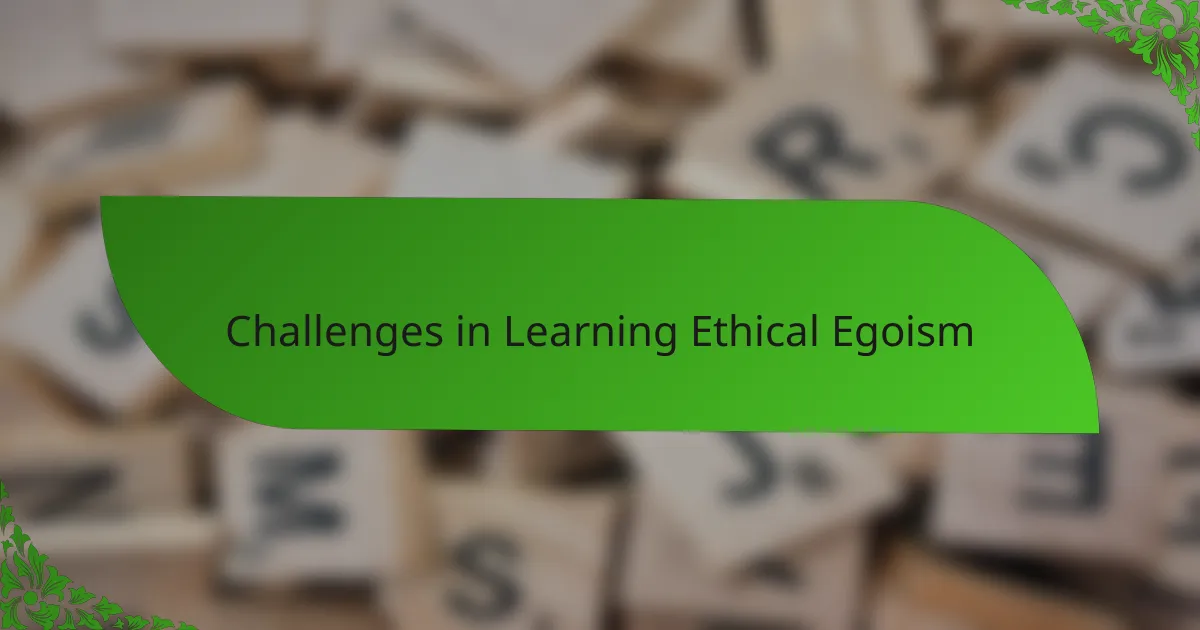
Challenges in Learning Ethical Egoism
One challenge I faced while learning about ethical egoism was overcoming my initial bias against the idea of putting myself first. I kept wondering, “Am I turning into a selfish person if I embrace this philosophy?” It took time to understand that ethical egoism encourages self-care without necessarily dismissing the value of others.
Another difficulty lay in reconciling ethical egoism with everyday social expectations. How do I act in my own best interest without alienating friends or family who expect me to prioritize them? This tension often made me feel stuck between theory and practice, forcing me to rethink my approach to relationships.
Finally, grasping the implications of everyone acting in their own self-interest was intellectually daunting. I asked myself, “If everyone pursues their own good, won’t conflicts just explode?” Wrestling with this question challenged me to think critically about cooperation and competition in a world shaped by ethical egoism.
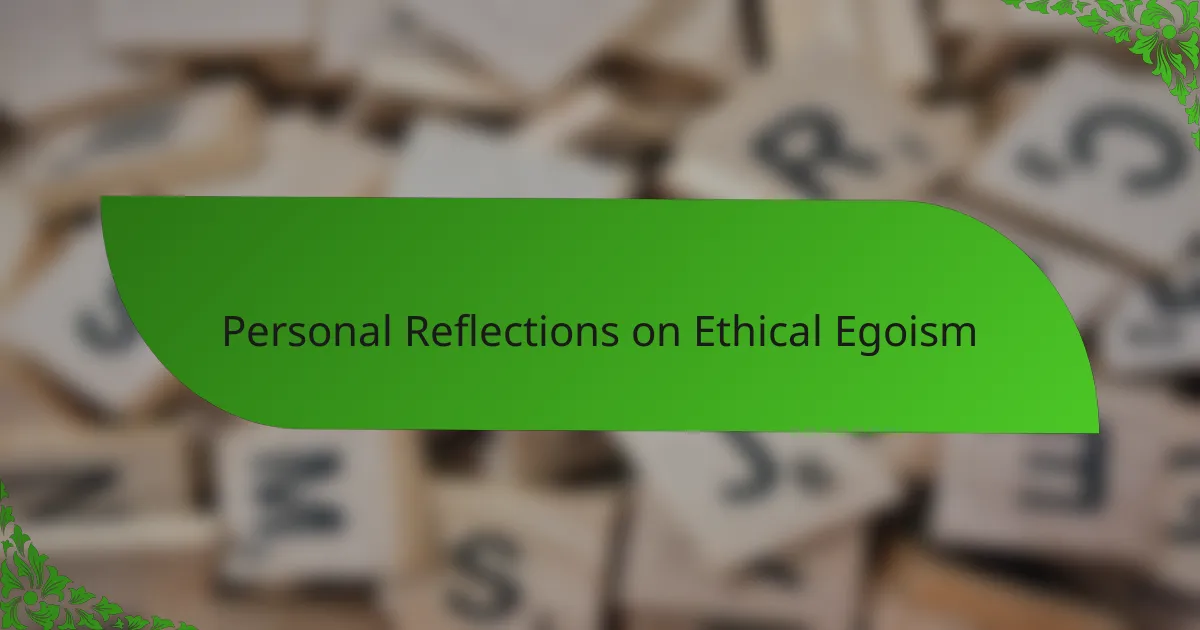
Personal Reflections on Ethical Egoism
Reflecting on ethical egoism, I find myself wrestling with the fine line between healthy self-interest and selfishness. There were moments when prioritizing my own needs felt uncomfortable, as if I was betraying some unspoken moral code. Have you ever noticed how easy it is to slip into guilt when you finally decide to care for yourself first?
At the same time, embracing ethical egoism helped me recognize the importance of self-respect in making moral choices. It’s freeing to realize that looking out for my well-being isn’t just acceptable—it might be essential. This shift in perspective made me reconsider past decisions where I sacrificed too much and ended up feeling depleted.
Yet, I can’t ignore the tension that ethical egoism presents in my relationships. When everyone acts out of self-interest, how do we maintain trust and cooperation? Working through this question led me to appreciate empathy and open communication as vital tools—balancing my needs while staying connected to others.
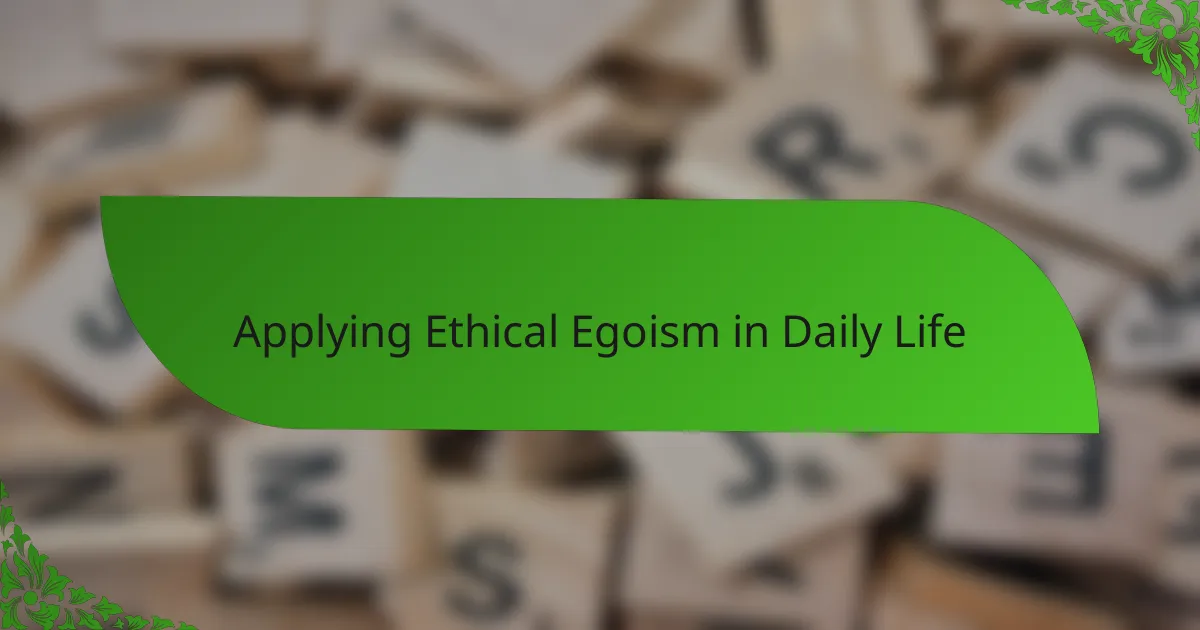
Applying Ethical Egoism in Daily Life
Applying ethical egoism in daily life quickly revealed to me how often I neglected my own needs in the name of being “good” or “selfless.” I noticed that setting clear boundaries—like saying no without guilt—actually improved my overall happiness and made interactions with others more genuine. Have you ever felt drained because you constantly put others first? That’s where ethical egoism taught me to pause and reconsider.
Sometimes, applying ethical egoism felt a bit like walking a tightrope. How do I pursue my own interests without seeming selfish or hurting someone else? From experience, I learned that being honest about my priorities often led to more authentic relationships, even if it meant some tough conversations. I realized it’s not about ignoring others but about respecting myself enough to act in ways that truly benefit me.
Yet, this approach also meant accepting that others might do the same—and not always in ways I agree with. That awareness pushed me to develop patience and better communication skills. I found that ethical egoism, while focused on the self, actually encouraged me to engage thoughtfully with others to find mutual respect. Doesn’t that feel like a more realistic and balanced way to navigate everyday life?
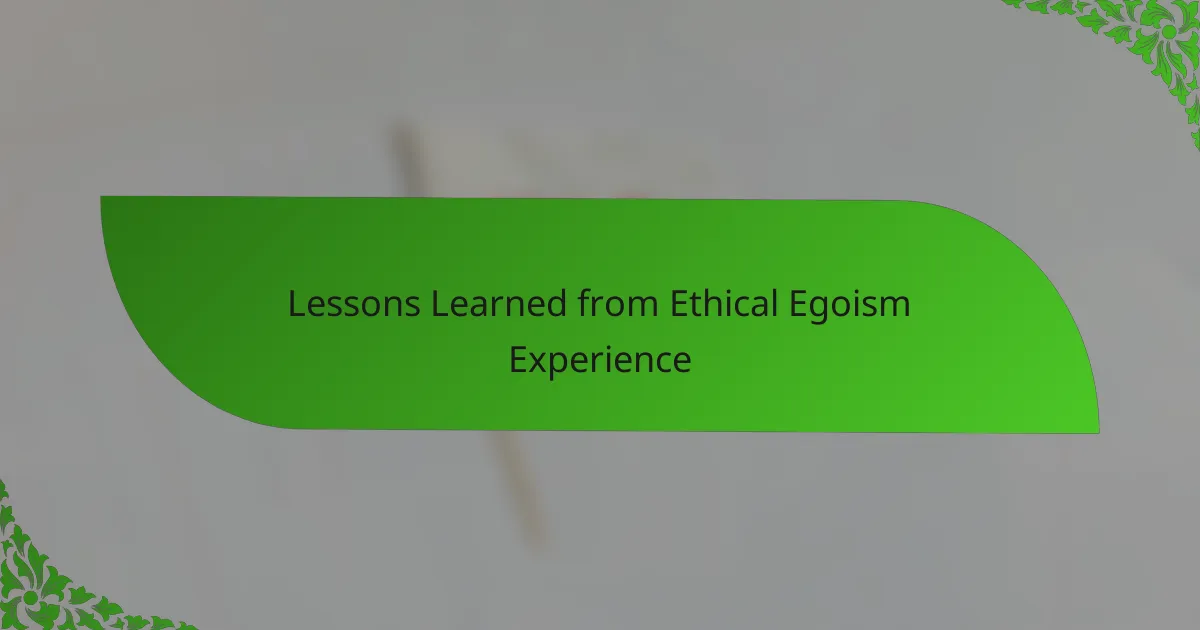
Lessons Learned from Ethical Egoism Experience
What stuck with me most from learning about ethical egoism is how it redefined my sense of responsibility—shifting it from purely outward obligations to a balanced focus that includes myself. I realized that recognizing my own interests doesn’t have to negate care for others; rather, it underlines the necessity of self-respect as a foundation for ethical living. Have you ever noticed how neglecting yourself can quietly erode your ability to act genuinely towards others?
Another lesson came through trial and error: practicing ethical egoism isn’t a free pass to ignore others, but a call to honest self-assessment and clear boundaries. I remember feeling uneasy the first time I said no to someone without justification—it was strange, yet empowering. That moment taught me that putting myself first responsibly can actually improve my relationships by preventing resentment and fostering authenticity.
Still, embracing ethical egoism made me confront the tricky reality that others will also act out of self-interest, sometimes clashing with mine. This pushed me to develop empathy and communication skills—not to suppress my desires, but to negotiate coexistence thoughtfully. Isn’t it fascinating how a philosophy centered on self-interest invited me to deepen my understanding of cooperation and mutual respect?